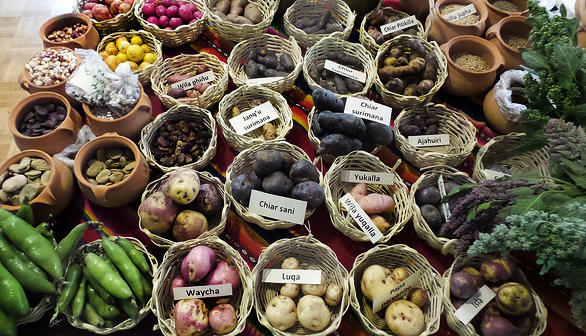Celebrating the diversity of Andean crops in Bolivia

Research fellow Gennifer Meldrum writes about stakeholders coming together in Bolivia to celebrate achievements in using and safeguarding Andean crop diversity in the Lake Titicaca region of Bolivia.
By Gennifer Meldrum, Research Fellow, Nutrition and Marketing Diversity
A two-day meeting in La Paz (3-4 February 2015) has marked the close of a research initiative on neglected and underutilized species. This initiative was supported by the International Fund for Agricultural Development (the IFAD-NUS project for short).
Since 2011, Bioversity International has been working with partners in the Lake Titicaca region to enhance the use and safeguarding of Andean crops (quinoa, cañahua, native potatoes and tubers: oca, isano and papalisa) to strengthen food security and resilience of agricultural systems, which are severely challenged by climate change.
On the first day of the meeting, farmers gathered to exchange experiences with the project, seeds of hardy varieties, and methods for coping with climate change and maintaining traditional crop diversity.
Farmer Mario Quispe Flores from Corqueamaya described how hail, frost, and rain have become more unpredictable and excitedly described how he has been using the data from the weather station that was installed in his community to understand how his local crops are responding to the changing environment: "We want to improve. We are undergoing a process of research and registering the resistance of different varieties: [potato variety] kollu is resistant to frost, waycha is vulnerable".
Another farmer from Antaquira described how cañahua, a relative of quinoa, is a vital resource for his community: "Small, powerful and brave, the winner against frosts and hails, resistant - she is the queen among all”. He also noted how important it is to recover their ancient varieties, which is something the project has facilitated. In his community he remarked that “papalisa and isaño negro have been introduced and produced”.
Farmers brought seeds, plant cuttings and foods for display and exchange, which included many quinoa, cañahua and native potato varieties, as well as fava bean, barley, and maize seeds, among others. Some of the traditional dishes were delicious and beautifully prepared, such as heart-shaped cakes made from cañahua flour and sculptures of cows made from a coarse quinoa bread known as ‘kispina’. The community of Corqueamaya served up a variety of cakes and cookies from recipes that have been integrated in school feeding programs as a result of project actions. A few communities displayed freeze-dried potatoes, ‘chuño’ and ‘tunta’, which they explained are strategic sources of food during times when potatoes are scarce.
They also proudly displayed community biodiversity registers. These registers, introduced for the first time in Bolivia by the project, monitor the performance and distribution of local crops, and document their features, cultivation practices and cooking preparations. The farmers walked around and discovered the booths of neighbouring communities and exchanged seeds and ideas – something the project has been promoting through similar diversity and seed fairs in Bolivian communities.
Policymakers, private sector representatives and research and development agents came together on the second day to learn about the project and explore opportunities to leverage and scale up the best practices derived through the work. A major achievement of the project was the establishment of a network of custodian farmers, champions in maintaining traditional crop diversity. This network and its linkage with the national conservation program were a strong focus of the discussions.
Dr Alvaro Otondo (manager of the genetic resources unit at the Instituto Nacional de Innovación Agropecuaria y Forestal (INIAF)) described the recent restructuring of the institute, which now features complementary linkages between ex situ and in situ conservation. As a result of lobbying and ground-setting work in the project, custodian farmers have become an integral component of the national in situ conservation effort and were given official recognition for their important contribution to national food security and preservation of Bolivian biocultural heritage.
In promoting this close interaction between INIAF scientists and custodian farmers, the project coordinated a visit for the custodian farmers to the national genebank in Toralapa. Carolina Alanoca (INIAF) reported how successful the visit was and welcomed the farmers to return to the genebank anytime to share knowledge and experience. INIAF plans to broaden the ex situ-in situ interactions and involve more farmers from all regions, building on the innovative approach and network developed during the project.
The meeting showcased achievements that have been possible because of the genuine collaboration between farmers, researchers and government agencies. There was strong indication that the work will be leveraged and built upon by Fundación PROINPA and INIAF through ongoing and possibly new projects. One of the custodian farmers – Viviana Herrera – was already invited to participate as a delegate in the Indigenous Peoples Forum organized by IFAD last December in Paraguay, which was a great signal of the far reaching impact that this work has had towards empowering and raising the visibility of poor and vulnerable people and women in particular.
The IFAD-NUS project was jointly implemented by Bioversity International, PROINPA, and several NGOs (Samaritan's Purse, CETHA Tupac Katari, and CARE) in eight communities of the North Altiplano (Cachilaya, Coromata Media, Antaquira, Pucamaya, Erbekalla, Rosapata, Corqueamaya and Suriquiña) with collaboration from INIAF. The project has also been active in India and Nepal to strengthen the role of on-farm conservation of underutilized crops in climate change adaptation. The final project meetings in the South Asian countries will also take place this February.
Photo album on Flickr: Final IFAD-NUS meeting in Bolivia
For more information, contact Gennifer Meldrum, [email protected]
